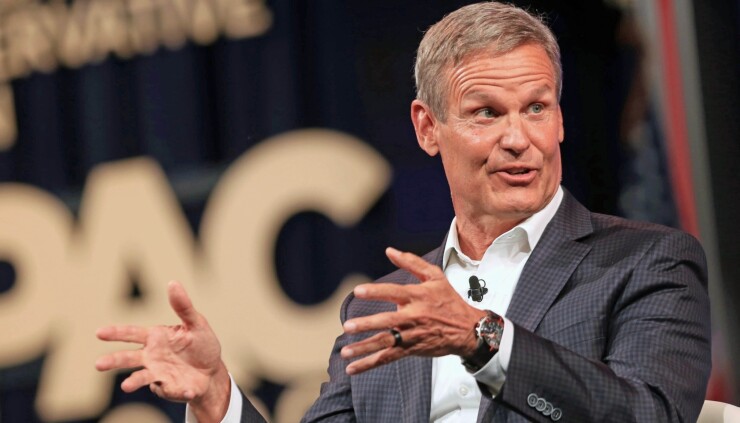Fresh legislation in Tennessee, major projects in Georgia and a long-awaited bridge replacement in Louisiana are pushing the Southeast region to the forefront of national public-private partnership activity in the toll road sector.
"The Southeast is where the action is when it comes to P3s," said Baruch Feigenbaum, senior managing director of transportation policy at Reason Foundation.
Many of the projects, some years in the making, are advancing due to P3-friendly administrations offering the kind of support needed for politically unpopular actions like new tolls.

States like Louisiana and Tennessee, which have never relied on tolls, are now turning to the fees amid dwindling gas tax revenue and growing congestion.
"As transportation funding needs to be diversified, places that historically have not participated in user fee toll roads are now participating," said Moody's Investors Service analyst John Medina.
In the Southeast, where many states are enjoying brisk population growth, administrations are promoting toll road concessions as a way to manage traffic congestion that in some areas has earned a spot on the American Transportation Research Institute's
"First and foremost you've got to have political leadership," said Rick Cosgrove, a partner at Chapman & Cutler, speaking Tuesday during an "Innovations in Infrastructure" conference hosted by the University of Chicago Harris School of Public Policy and the Bond Dealers of America.
"It's building that wide support to understand how this is better over the long term."
Georgia has multiple toll-based P3s on tap in the Atlanta area, while Tennessee is the latest state to authorize P3s for tolls and Virginia remains a leader with its vast network of managed lanes.
Early frontrunner Texas has in recent years tapped the brakes on transportation P3s amid political pushback. After former Texas Gov. Rick Perry enacted broad P3 legislation that launched a building spree of toll roads, the Lone Star State under Gov. Greg Abbott has put a moratorium on any new toll roads.
"In the Southeast now, you've got more moderate Democrats and Republicans, who are focused on businesses interests, growth, and transportation," Feigenbaum said, noting that Texas elected officials tend to be more conservative Republicans opposed to tolling.
"It's a certain type of leader more in the moderate vein who tends to get these projects pushed through," he said.
Widely considered the national leader in the transportation P3 space, Virginia has enjoyed strong bipartisan support for P3s that has survived several administrations. The state now has 13 P3s either completed or underway, the most in the country.

Under Republican Gov. Bill Lee, Tennessee is the latest state to enact P3 authority for transportation projects after the state Legislature
"As families and businesses move to Tennessee in record numbers, we need a transportation plan to keep up with the pace," Lee said in a statement when he signed the bill. "Our strategy will meet our transportation needs across rural and urban communities, without new taxes or debt."
Preliminary proposals call for managed lanes to be built in the state's fastest-growing urban areas, including Nashville, Memphis, Knoxville, and Chattanooga.
Under Georgia GOP Gov. Brian Kemp, the state has launched what are some of the largest toll-road P3s in the nation.
The
In 2022, Georgia dropped the availability-payment structure and designed the deal as a revenue-risk design-build-finance-operate-maintain with a 50-year concession. Last September, the state's transportation department
Georgia is also using a P3 to reconstruct the Atlanta Beltway I-285 in four separate stages, a $6 billion project.
In Louisiana,
The state's two P3s were procured under former Louisiana's Department of Transportation and Development director and
"It needs to be replaced, it's 20 years past its life, but the question of tolls is subject to a lot of debate in the Southeast," Medina said. "You don't see tolling in some areas of the South because of the idea that you shouldn't toll something that was once free," he said, noting that the state Legislature approved the measure after much debate.
Louisiana released a request for proposals for the project in March, and expects to name a winning bidder by the end of the year.
Louisiana is also planning to replace a bridge across the Mississippi River in Baton Rouge, an estimated $1 billion project, but it's unknown whether this will be structured as a P3.
In Alabama, a $2.7 billion Mobile River Bridge and Beltway replacement project was
Partnering with private entities for transportation projects transfers some risk to private partners, but the revenue raisers can be difficult to sell.
"It comes down to three things: privatization, taxes or tolls," said Kyle Mangini, the global head of infrastructure at IFM Investors,
"And no one likes those three things. All three are politically difficult and easy to take shots at," Mangini said. "But the outcome can be so much better."





